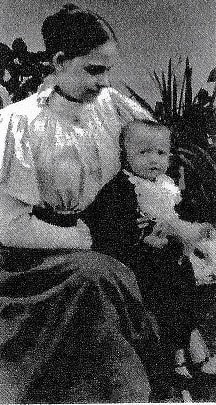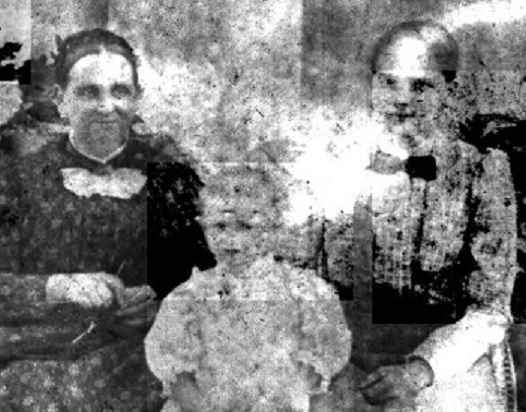 Louise (Hahn) Nottott with Maya (my great grandmother and grandmother_ Louise (Hahn) Nottott with Maya (my great grandmother and grandmother_ When those of the Oraon tribe were asked what they called themselves, they replied: En Kurukhan or "I am a speaker," as opposed to one who cannot speak Khurukh. Ferdinand found this like how some European tribes identified themselves. The Slovenians call themselves Slovo (word), and they call Germans Niemzi (mutes). Essentially, you are what you speak. Ferdinand may have lived in the jungle plateau region of east India, but he never stopped being German. What made him German was his mother tongue and his connection to the land of German speakers. A land of diverse ethnic groups and tribes that were considered Germanic from ancient times, reporting back to the 2nd century BC and extending into late antiquity to the Middle Ages when Christianity came to the land. But here in this jungle region, surrounded by other languages, a cross-cultural identity was being created within him and his children.[1] Except for the occasional German visitor, the only German spoken in Lohardaga was among family. The Hahn children had to learn the German language, culture and history so that they would be ready to go to school in Germany when the time came. Ferdinand taught the oldest children: Louise, Mietze and Theo. Teaching his own mother tongue made him aware of the complexities of language, as he compared and contrasted German, Hindi and Kurukh. In Kurukh all irrational existences have neither gender nor number. There is a form to denote plurality in neuter nouns; but when verbs are conjugated the noun is then treated in the singular. Women in the singular appear to be feminine but in plural are male...[2] In German, on the other hand, there are three gender markers in the singular: der (masculine), die (feminine), and das (neuter); the definite article, die, is used in the plural. English, which also was taught to the children, uses only one marker for the definite article of all nouns, namely “the.” Hindi doesn’t use articles, but it has gender indicators. For example, kursee (chair) is feminine because it ends in “ee”. Kurukh is the simplest, it doesn’t have articles, and objects do not have gender. Ferdinand reasoned over such distinctions, but his children naturally knew the application of gender for each language. Then when he taught them numbers in German, both the cardinal and the ordinal, up to ein Milliard he noted that Kurukh had no conception of a hundred let alone a million. Ferdinand asked his children: “Did you know there are only two numbers in Kurukh: singular and plural? In fact, in Kurukh number and gender are only given to rational beings”[3] Seven-year-old Louise asked what was a “rational being.” She was told humans, God and spirits, and maybe a few animals. Something that feels or thinks. She questioned her father, “But Papa if something does not think and feel, do we need to count it? Does anything need to be counted?” She didn’t like learning numbers, but she also could not explain why she didn’t like being asked, for example, “How many mangos are in the basket?” Or “How many people live in our house?”[4] Her father thoughtfully replied that it is important for organization and development to quantify and evaluate things and people. “We must know the number of members of our church, for example, so that we can know how best to serve them, and where to put resources.” Then he added with some annoyance, remembering that the accounts of the church had once again not balanced, sighing, “But then some never seem open to progress and are simply too stuck in the mud.” Louise could not understand why her father was annoyed. She didn’t think it was about anything she had said, so she ventured to ask one more question. “Papa, isn’t that a good thing?” “What do you mean, child?” Ferdinand asked. “To be stuck in the mud. Isn’t that a good thing?” Ferdinand laughed, recalling that Sulaman Khalkho once corrected him about the meaning of such an expression, “For the Adivasi the image of being stuck in the mud means the person is rooted, and unshakably committed to his community. I know for you it means the person is stubborn, but for us this is a good thing.”[5] His daughter must have overheard that conversation. She seemed to be starting to think like an Oraon. Her question had been more profound than she understood. She may not have understood why her last question was left unanswered, but she felt proud that she had made her father happy as he repeated to himself, “Out of the mouths of babes.” see also: http://www.journeyfromjourneyto.com/writers-journey-blog/language-identity-perspective ---------- [1] “Third-culture identity”, Pollack and Van Reken – 2009. [2] My paraphrase FH – 1896. [3] Ibid. [4] During a visit in Ranchi I overheard a German ask an Adivasi if they knew the population of India, to which the person replied, too many. I do not believe this was a matter of lack of knowledge, but a cultural characteristic among the Adivasi reluctant to quantify anything. I attended several large gatherings and was often told that there were 5,000 or 10,000 people in attendance, with an added comment “like when Jesus fed the people.” Those numbers are representative rather than quantitative. [5] Bishop Nirmal Minz told me the Adivasi interpretation of this expression.
1 Comment
Leave a Reply. |
Details
Archives
May 2020
Categories |

 RSS Feed
RSS Feed
